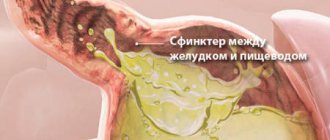Gas formation in infants is the most common problem.
The baby behaves restlessly, often wakes up, and is capricious.
The main factors that cause colic are the immaturity of the baby’s digestive system, and a violation of the diet of the nursing mother, who contains foods in her diet that cause gas formation in the baby (newborn) and bloating.
Symptoms of gas formation
The main reason for gas formation in babies is improper nutrition of a breastfeeding mother. A large amount of gas accumulates in the child’s intestines. This can be defined as follows:
- The baby is excited, but there are no visible reasons for this (there is no fever, the diaper is clean, he is fed).
- He presses his knees to his stomach, is capricious, and is almost impossible to calm down.
- Cries bitterly day and night.
- The gases come out quite loudly and have an unpleasant odor, after which the baby calms down slightly.
- The child has a pale complexion.
- The abdomen is hard and swollen.
- Whims and tears begin literally 10-15 minutes after eating.
- Problems with bowel movements (constipation or intestinal upset).
Inflammation of the lacrimal sac or dacryocystitis in a newborn is an unpleasant pathology in childhood that requires treatment.
You can read about the pros and cons of long-term breastfeeding here.
What to do if your child has coughing attacks at night? You will learn about the causes of cough and methods of treatment in this article.
Causes of bloating in children
Spasms and severe pain during gas formation in children subside as the gases pass. This problem begins to worry babies and their parents from the age of two weeks. It can be associated with the lack of a normal diet in nursing mothers. Formula feeding can cause bloating in children if the baby is fed the wrong or low-quality formula, which is best avoided.
According to statistics, colic and bloating are observed in every 3-4 children, often boys. Discomfort in children occurs more often in the second half of the day. Bloating in children stops at 4 months, since the main cause of bloating and gas formation is no longer associated with imperfections in the gastrointestinal tract. Incorrect nutrition can cause the problem.
What foods make a child's stomach swell? The stable functioning of the intestines can be disrupted by children after three years of eating foods with a high content of fiber and starch, and carbonated water. After five years, children are fed the same dishes that adults prepare for themselves. Parents should be extremely careful when choosing foods for children of any age. It is necessary to teach the child not to overeat, not to talk while eating, and not to eat sweets in large quantities.
Foods that should be excluded from the diet of a nursing mother
There is a direct connection between the nutrition of a nursing mother and the quality of breast milk. Accordingly, if a woman eats a product that causes gas, the baby will suffer from colic. Therefore, during breastfeeding, many foods are contraindicated for a woman. It is recommended to follow a strict diet for the first 3 months after the birth of the child.
Products to exclude:
- Black bread. This product is produced by fermentation and may cause bloating. It can be replaced with cumin bread. They will not cause harm, but will only be beneficial, as they are rich in vitamins.
- Milk. It causes colic. Moreover, milk can provoke an allergic reaction in a child. You should also not drink boiled milk or eat porridge based on it. The maximum that is allowed is sometimes tea with milk (goat).
- Legumes. All beans can cause gas - these are peas, beans, lentils, chickpeas, soybeans.
- Fruits and vegetables. Raw foods are very difficult to digest and fermentation processes begin in the body. Moreover, contamination by microorganisms may occur. If you really want this or that fruit (vegetable), it should be heat treated. You need to completely avoid cabbage, grapes, beets, cucumbers, citrus fruits, and exotic fruits.
- Sweets. You cannot eat pastries, chocolate, cream, or sweets.
- Pickles and marinades. They irritate the intestines.
- Nuts, especially peanuts.
- Mayonnaise, ketchup, sauces. Not only can they cause colic, but they are very harmful foods in general.
- Coffee, carbonated drinks, alcohol.
After 2 weeks after birth, carrots, zucchini, potatoes, and pumpkin can be introduced into the diet, but they need to be steamed. You are allowed to bake apples.
Basics of proper nutrition for mom
Let's look at what foods cause gas formation during breastfeeding.
During breastfeeding, certain rules should be followed to avoid gas formation:
- A nursing woman's diet should include lean meats and fish.
- From fermented milk products you can eat kefir, yogurt, cottage cheese, cheese, for example, “Zdorovye” or feta cheese.
- It would be good if the meals were separate. Products that do not combine well with each other will make it difficult to digest food.
- During the lactation period, you should drink a lot of fluid, at least 2 liters per day. Half of this volume should be clean water. The second half is compotes, fruit drinks, tea, fermented milk products.
- If a new product appears in the diet, its consumption should be gradual. It is better if the mother tries some product in a small amount, and then observes the baby’s well-being for several days. If all is well, you can continue to eat the product little by little. If there are signs of bloating or allergies, it is canceled for 1-1.5 months.
- You should not overeat, it is better to eat in small portions, but more often.
- In the first months after childbirth, you should give up not only exotic fruits, but also delicacies. It is strongly recommended to avoid smoked, fried and fatty foods.
While breastfeeding, you can drink herbal teas, they will improve lactation.
Dietary recommendations for a nursing mother
British nutritionists in the process of research found that the vast majority of people do not eat enough fiber that is beneficial for the body. For this reason, the country's National Health Service strongly recommends that all breastfeeding mothers include as many fiber-rich foods as possible in their diet, while also remembering to drink enough fluids. Mothers should increase the number of foods with fiber gradually so as not to cause increased gas formation. Every woman should eat a balanced and rational diet, making her diet as complete as possible.
All newborns experience increased gas formation and colic. It's just that some babies are more bothered by colic than others. But to date, there is no direct evidence that there is a direct relationship between maternal nutrition and baby colic. This problem most often plagues newborn children because their digestive system is not yet mature enough. The older the baby gets, the less colic bothers him. When the child grows up, this question ceases to be relevant.
Note to mothers
During lactation, a meager diet is as harmful as prohibited foods. Mom should have a complete and varied diet:
- Preference should be given to cooking methods such as stewing, baking, boiling or steaming.
- It is better to cook those foods that have a green tint (zucchini, broccoli, cauliflower).
- Cabbage promotes the formation of gases in a child’s intestines, but only in its raw form. If you simmer it a little, you’ll get a pretty healthy dish.
- Apples can be eaten raw, but without the peel. It is preferable to bake them.
- Hard cheese can be eaten without fear, just like cottage cheese. Milk is introduced very carefully and little by little.
- Meat and fish dishes should be steamed or boiled.
- Porridge is a must in the diet. Oatmeal is considered very healthy; it has a positive effect on digestion. It is allowed to add a small amount of dried fruits.
- Daily consumption of drinks that have a positive effect on the baby’s well-being and help avoid constipation will be beneficial. Tasty and healthy: sugar-free compote, green tea, rosehip decoction.
- You need to be careful with dried apricots and prunes. Excessive consumption can harm mother and baby.
The problem of gas formation can also occur in babies who are bottle-fed. Most often, this is the immaturity of the baby’s digestive tract; he is not ready to digest mixtures.
This problem can be solved, but it will require a lot of effort and patience. You'll have to experiment a little, buying mixtures of different brands and types, and study the composition. Unfortunately, only through trial and error will it be possible to choose the right baby food (juices, cereals).
Experts say that many infant formulas contain palm oil, which contains acids. It is they who contribute to gas formation.
Prevention measures
To prevent increased gas formation in infants, you need to follow simple rules:
- Monitor the nutrition of mother and baby. Do not abuse products from the prohibited list;
- After eating, keep the baby in an upright position for 15-20 minutes;
- Before eating, place on stomach;
- Get a massage daily;
- Do not overfeed the baby, but do not leave him hungry. Otherwise, next time he will begin to eat greedily and swallow air;
- Correctly attach the baby to the breast. When feeding from a bottle, make sure that the baby does not swallow air. It is important to position it at an angle so that the head is higher than the stomach.
Correct baby position when feeding
Increased gas formation is primarily explained by the diet of mother and child. To prevent discomfort, it is better to abstain from prohibited foods in the first month of a baby’s life. Komarovsky warns that if no diet helps, and the child continues to suffer from a bloated belly, there is no need to torture yourself, you can return to your usual diet.
Food diary
We have already become familiar with the foods that breastfeeding women should not eat.
But there are also products that are blacklisted individually by each mother.
For convenience, you need to keep a special food diary.
It should record absolutely all foods and drinks consumed during the day.
You also need to indicate the exact time of meal. Such records will help you find the product that caused gas formation in your baby. Each product is absorbed from the gastrointestinal tract in approximately 4-5 hours. After this period of time, the active substances pass into the mother’s breast milk.
If it is observed that after eating the baby begins to be capricious, cry, tuck his legs, and his tummy is swollen, a food diary will help to determine the product consumed about 4 hours ago.
If there is only one product, it is excluded; when there are several, they carefully look at each one. After a couple of days, introduce them into your diet, only one at a time.
So in a couple of weeks you can figure out what exactly triggered the colic.
In a child under one year old, the intestinal tract is not fully formed, so diarrhea and constipation may occur. Constipation in a 1 month old child - what to do and whether it is necessary to treat?
Read about the importance of gymnastics for newborns in this topic.
Some mothers give their babies sweetened water. This cannot be done, since sugar at such an early age will increase fermentation in the intestines.
Sometimes the mother of a baby is on a very strict diet, so her body may lack vitamins and minerals. In this case, it is recommended to buy a vitamin-mineral complex specifically for nursing mothers. To help the child cope with a problem such as gas formation, the mother needs to reconsider her diet. Exclude from it all products that provoke the problem.
How to help a child with flatulence
When a child suffers from abdominal discomfort, the parents’ task is to alleviate his condition. There are several ways to help your baby.
First aid
To save your baby from unpleasant sensations, you need to use the following tips:
- Place a warm diaper on the baby's tummy. It is ironed, making sure that it is not too hot;
- Undress the baby and place it on mother's belly. Skin-to-skin contact reduces flatulence.










